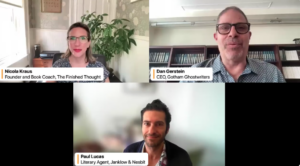With self-publishing on the rise, it’s vital for authors to keep an eye on the increasing opportunities and happenings along this publishing path. This post was originally published on the Alliance of Independent Authors website by founder and director Orna Ross. It has been reposted here with permission from the author.
This New Year marks not just the turning of a year but the beginning of a decade. Ten years ago the iPhone was a new-fangled piece of technology and ebooks were a rarity. Today, as indie authors get to grips with a plethora of technology, ALLi director Orna Ross looks to the future, with seven key self-publishing predictions for 2020 — and the 2020s.
We could make lots of self-publishing predictions for 2020 and the decade to come. Publishing has become a sector of great change and the pace will not slow in the 2020s. But what do we most need to stop and notice now, as we close the first decade in which authors became serious publishing players?
What coming developments and trends will enable more of us to build more beautiful books and more buoyant author businesses? What’s likely to create most opportunities for most indie authors?
Before getting stuck into the predictions, it’s worth saying that as authors—as human beings—we are not just passive responders. We replicate and reinforce trends through our actions and ideas. The future is not something that will happen to us; we create the future through the choices we make.
When it comes to publishing, our creative choices have an impact for other authors, not just ourselves. When we make an empowered choice from creative principles, the whole community is enabled and strengthened. When we choose unethical behavior, or lazy writing and publishing, we are not just shrinking our own opportunities, but everyone’s.
[Read more: The Power of Positioning for Authors and Publishers]
For further discussion of these trends, and to ask questions and share your own ideas, tune into next week’s AskALLi self-publishing salon with me and ALLi’s Enterprise Advisor Joanna Penn in Facebook Live video or podcast.
I link to a number of ALLi (Alliance of Independent Authors) publications below. All ALLi books are free to members, one of a range of member-only benefits. If you’re not yet a member, we’d love you to join us. Every member makes us stronger.
Self-Publishing Predictions for 2020 and the 2020s
1. Global Reading Grows
The global publishing market is expected to register a revenue of about USD 356 billion by 2022 and publishing will continue to grow faster in countries outside the US and UK, with new services growing up to accommodate and further that growth.
“The International Publishers Association has blazed trails this year, and transformed the prospects of supposed publishing backwater regions like Africa and the Arab markets,” says Mark Williams of The New Publishing Standard, a must-read for indie authors who want to stay on top of global developments.
Currently, Amazon is by far the biggest player in self-publishing in the US and UK and growing swiftly in other countries where it has a presence but three other distributors stand out in terms of reaching more territories in ebooks: Kobo Writing Life, PublishDrive, and StreetLib. Similarly, Ingram Spark in print books and distributors like Findaway Voices in audiobooks are reaching parts of the global book-buying audience that are not served by KDP print or ACX, Amazon’s ebook and audiobook platforms.
As self-publishing gains momentum around the world, existing platforms will extend their reach and services—Amazon KDP is now offering ads in Italy, France and Spain, as well as the US, UK and Germany (Read William’s post on what that might mean for indie authors here) — and new platforms will emerge that make it easier for authors to market content globally.
Expect Amazon and Ingram Spark to continue to expand; Kobo Writing Life to be bought; Apple to focus again on Apple Books when Tim Cook, the current CEO departs; Barnes & Noble’s Nook to also rise from the ashes as soon as James Daunt has sorted out the physical bookstores (perhaps also providing a platform to Waterstones); and Google Play to step up their services, with an improvement in their service to authors in 2020.
2. Publishing Networks Decentralize and Distribute
We have been very one-dimensional in our thinking about how we get books from authors to readers. By the end of the decade we’ll have moved away from centralized networks (a central point of contact for content creation and merchandising e.g. a trade publisher or Amazon KDP owning the route to market and access to readers) to distributed networks (where there is no center and everyone gets equal access).
In 2020 we’re entering a transition year, as more indie authors, and other savvy digital publishers, decentralize their digital book sales and distribution, moving to sell directly from their own websites while simultaneously distributing through a number of outlets on a non-exclusive basis (self-publishing 3.0).
This is a transitional stage to the distributed networks that will become more mainstream as the decade advances. The best-known example of a distributed network to date is the blockchain, which has a number of potential advantages for authors and other indie makers, in that it makes ownership of content indisputable, trains readers to go-to source, and provides a secondary market for digital products, allowing the creator (author) to be paid on resale.
Services will spring up to provide what’s become known as Blockchain As A Service (BaaS) for authors, which will enable writers to develop their own blockchain products and smart contracts without owing blockchain-based infrastructure.
Getting the readers onboard is the primary challenge and 2020 will be significant as the year when Facebook introduces its own cryptocurrency, Libra, to those who power the 2.5 billion monthly logins to Facebook.
3. Author Business Models Diversify
At ALLi we’ve identified ten business models being used by today’s authors to make a living from writing and in 2020 we will see more and more authors come to understand how self-publishing changes them from being professionals who write to business owners who write and publish.
And that the best insurance author can have against any seismic changes in our industry is a large and growing group of engaged readers on a platform we own and control.
As more authors move more fully into self-publishing 3.0, we’ll see author business models evolve and diversify. One development we haven’t seen yet is a band of authors coming together to offer a direct subscription model to their shared readers in their niche.
4. Growing Uptake of Self-Publishing Technology
People have been talking about the future of artificial intelligence in publishing for some years now but this year, we saw that many of the things we thought were far into the future are already here. AI, or artificial intelligence, is a term that is increasingly used to cover a broad range of tech and functions from algorithms to voice assistance.
Early indie adopters like Joanna Penn and Michael Anderle are starting to use AI for making translations and for voice narration of audiobooks and in 2020 we’ll see a lot of authors jumping in.
Some authors are resistant to technology and can experience hearing about “the latest new thing” as confusing or overwhelming, especially as so many latest new things keep coming at us. But more authors will realise that for an indie author to say “I don’t like technology” or “I don’t like marketing” is equivalent to saying “I don’t like myself” and “I don’t like my readers”.
And that AI and any other tech that helps us to create, distribute and market better and faster should be embraced.
5. Audio Becomes Integral to Author Business
In 2020, we’ll see voice assistants like Amazon’s Alexa shift from being reactive in nature—largely answering questions—to being proactive. From a publishing perspective, voice assistants will soon be recommending books based on internet searches, buying patterns, and existing reading, audio and radio, video, film and TV consumption.
When a reader asks Alexa for a book in your genre, how do you ensure your books will be recommended? This is a question more indie authors will want to answer in 2020 and beyond.
We’re also likely to see new startups entering the space, keen to provide books-focussed voice-assist technology to solve this challenge for authors and other smaller publishers.
Audio for authors is much wider than voice search. Text to speech, speech to text, podcasting and other aspects of AI for voice are all transformative for an author business, increasing production and discoverability in many ways.
Authors are shy and many will continue to fight shy of video but audio will become ever more integral to author business in 2020 and through the decade.
6. Growth in Personal Publishing
In one of our conversations about the year to come, ALLi’s blog editor Sacha Black said:
We’re seeing an increasing rate of burnout among authorswith the write-fast-publish-hard model [and] I think we’re seeing the start of moving more towards connecting on a more personal level with readers, rather than flooding the market.
Social media, content marketing and advertising will continue to be the top three revenue drivers for indie authors for the foreseeable future. Whichever method we use to attact readers, we need to be increasingly precise about a) our particular niche(s) and microniche(s) of a segmented readership; b) which platforms we are going to use to reach them; and c) how to effectively carve and shape our content (ads, blog posts, podcasts, social media updates, newsletters as well as books) to address our niche of readers, while still achieving our creative intentions.
This will be easiest, as ever, for those authors who do just one thing but new technology will make production and segmentation easier for those authors—and there are many of us—who like to spread ourselves about different genres.
Sustainable success will go to those who build long-term relationships with readers, learning how their affinities ebb and flow, and delivering great content that surprises and delights them.
7. Author Empowerment
The most significant development of the past 10 years is the one that gets talked about least. All the trends we’ve discussed here add up to one megatrend: an increasingly empowered author community.
Our own empowerment is something authors have been slow to grasp. We’ve gone from (most of us) being exclusively bound to one trade publisher to (most of us) being exclusively bound to one self-publishing service. In both cases, we’re rightly grateful to those who have helped take our words to the world. But now it’s time we looked around us and put some deep thought into what might be possible through author collaboration. That’s going to be the goal of ALLi this year and decade.
I’m not sure if this is a prediction or wishful thinking but I’d like to say that in the next ten years, authors will fully grasp the creative possibilities and that our sense of our own, and each other’s power, is experienced and expanded by working together to amplify our impact and influence.
We’ve seen some powerful examples of author cooperation but to date mostly for a short-term goal like hitting a bestseller list or producing a particular project. I’m talking here about something more widespread and longterm, something that has the potential to have an impact way beyond the author community.
We are part of a global maker movement and independent creators are becoming a force in every industry. What makes a creative business unique is that it is composed of equal parts of passion and profit, creative and commercial. And what has poisoned so much human interaction, and is poisoning the planet we live on, is the single-minded pursuit of commercial profit, without the balancing force of a deeper creative or spiritual purpose. A truly empowered creative class, with a sense of its own significance, making choices from creative as well as commercial imperatives, could seriously shift the world of business and commerce, and that could spread.
However that, or any of these predictions turn out, what is almost guaranteed–barring acts of god or global war—is that opportunities will continue to expand for authors and creatives around the world. If you want to influence hearts and minds with stories or ideas, there has never been a better time to try. If you want to earn a living from writing books, and are prepared to do the creative and commercial work to make it happen, you can.
What Won’t Change in Self-Publishing
We are part of a long line of writers who have used the published word—in illuminated manuscripts in scriptoria at the beginning, in text, audio, or video on digital platforms today—to reach across what divides human beings to communicate. To engage hearts and souls with our stories, our rhymes, our ideas, our imaginings.
The heart and soul of what we do as authors and publishers has remained unchanged since scribes sat down to copy out their manuscripts by hand. Now, as then, there’s no one pathway, and no easy pathway, to becoming a successful author, except to do our work, in service to our readers and the positive change we want to create in the world.
Through all the changes to come, we must carry on producing, packaging and positioning words that inform, educate, amuse, entertain or inspire, while generating enough profit to keep on doing what we do.
Wishing you a happy and productive 2020 and a happy new decade, dear indie author.
Gotham can help you guide your concept from idea to published book, including helping you navigate hybrid and indie publishing paths. Tell us about your vision below.
Author
-
Orna Ross is an Irish indie novelist and poet living in London. As well as writing and publishing her own fiction and poetry, she's on a mission to bring the wonders of digital publishing and creative business to other authors and creative changemakers, through the the Alliance of Independent Authors, a non-profit she runs with her husband Philip Lynch.
View all posts



